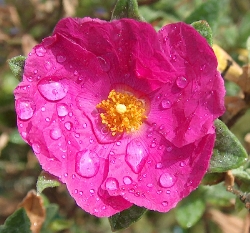|
Tim Kahl
Dwelling
This spring two ducks pass the afternoons
on the lawn and take cover in the shade
of the liquidambars. The mallard rests
among the white pellets of fertilizer and
contemplates his lady's vacant stare into
traffic. And then it starts to drizzle.
The ducks don't move. They tuck their heads
beneath their feathers and remain optimistic
that tomorrow will be merciful, its infinitesimal
joys like pinpricks of dry grass on the feet.
There will be the calm water of the pond to
tread, the regular stop providing counsel too,
and always the promise of ducklings in the air
like static between the trees. The ducks on
the lawn are ready, occupying their familiar space,
becoming one of the landmarks at three in
the afternoon. They partner in the grass with
the fertilizer scattered like rice at a country
wedding. And the rain falls harder. They brace
themselves for it, move closer. They respond to
the warmth of each other. This is necessary for
their resistance to the adverse days still coming,
when the sun is a renegade beating the earth's
clay with the flat of its hand, its heat streaking
into the red petals of the geraniums, into
the crimson tufts of the photinia, and
into the growing liquidambars, extending
their rafters over every grounded thing.
Souvenir
During the ceremony
the bride wears her baseball cap
backwards to let the rain
fall on her nose. Her dress,
still white, frightens the birds
away from the fountain.
Someone’s mother fills herself
with doubt and stares at
the brickwork of the patio.
So carefully arranged, they
never slide when a
shoe heel comes down on them.
They hold up the weight of all
the assembled guests who have
already started guessing
what the future has
in store for the couple.
The ceremony is history.
The music is gone.
Baseball season is over and yet
there they are: married in the rain.
Their uniforms are dirty,
their shoes retired.
Their eyes run across each other,
lost strangers in an airport.
They check the ground, then
they check each other to see
what has been postponed
as a roving toddler who has
broken free from his parents
begs for their string cheese
and popcorn. And suddenly
they think children are
nothing more than pigeons.
Like the pigeons in the
bleachers at Wrigley where
they first met. Nothing more on
their minds than catching a
home run ball, however unlikely
that is in the heat of August
among all those people
looking to have some fun,
hoping to take home a souvenir
but settling for a ticket stub instead.
And after the game is over, they leave
together and dream the same dream of
frightened birds that insist on being fed.
Kokomo Hum
In the middle of the fly-over where
lightning strikes are tracked per minute
and the transmission plant runs at
near capacity, a rumbling drones like
a diesel engine idling, like a vacuum cleaner
constantly torturing the carpets next door.
The sound blends with the traffic passing
through town on the highway.
The ground is conduit, and the dishes rattle
in the church kitchen of the Presbyterians.
No one at the Christian radio station can
explain it. Life-long residents are
moving away, citing dizziness.
They had not expected topsy-turvy
in the heart of central Indiana. They say
the corn and soy planted in straight rows
now seem slightly overstimulated.
They say the tremor lingers from when
Old Ben, the world’s largest Hereford,
broke its leg by stumbling. It could be
the thunder of ghostly hooves returning
to haunt the plains. It could be the song of
turbines, fans, compressors, wailing at night
for replacement parts. Anything large
that buzzes or whirrs is suspect.
Even the sun has been blamed,
but only by those who worship the moon.
They insist evil is a disease spread by light.
The days are an accumulation of pain
while at night the aircraft fly over
and send signals via buried antenna.
The susceptible line up at the clinic.
Graves are cautiously visited,
and the skeptics have begun to perfect
the traditional art of knocking on wood.
© Tim Kahl
|
